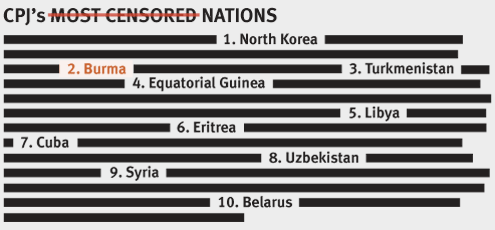Burma’s news media remained among the most restricted in the world, despite the transition from military to civilian rule and President Thein Sein’s vow to adopt a more liberal approach. The Press Scrutiny and Registration Department reviewed all local news journals prior to publication, censoring a vast array of topics. Criticism of the government and military was forbidden, although censors allowed more coverage of opposition leader Aung San Suu Kyi and some political and economic topics. Authorities exercised control with a vengeance: The nation was still among the world’s worst jailers of the press. Exile-run media continued to fill the news gap, but at a high cost: At least five undercover reporters for exile media were imprisoned. Regulations adopted in May banned the use of flash drives and VoIP communication services in Internet cafés.
Burma
» Civilian government takes few significant steps on press freedom.
» New restrictions imposed at Internet cafés; censorship still pervasive.
Editor’s note: In early 2012, the government released several journalists and eased some restrictions, although the nation remained among the world’s most repressed.
Burma’s news media remained among the most restricted in the world, despite the transition from military to civilian rule and President Thein Sein’s vow to adopt a more liberal approach. The Press Scrutiny and Registration Department reviewed all local news journals prior to publication, censoring a vast array of topics. Criticism of the government and military was forbidden, although censors allowed more coverage of opposition leader Aung San Suu Kyi and some political and economic topics. Authorities exercised control with a vengeance: The nation was still among the world’s worst jailers of the press. Exile-run media continued to fill the news gap, but at a high cost: At least five undercover reporters for exile media were imprisoned. Regulations adopted in May banned the use of flash drives and VoIP communication services in Internet cafés.
-
12
Imprisoned on December 1, 2011 -
2
DVB journalists sentenced -
174
Publications censored -
0
Arrests in Nagai case -
0.2%
Internet penetration, 2009
With the number of imprisoned journalists virtually unchanged, the new civilian government's record reflected no improvement from the oppressive approach taken by the military junta.
Two undercover reporters for the Democratic Voice of Burma were handed long prison sentences in 2011, CPJ research shows. Authorities have targeted exile media reporters in response to their censorship-evading reports, according to CPJ research. Burma remained among the world's five worst jailers of the press.
1: Iran: 42
2: Eritrea: 28
3: China: 27
4: Burma: 12
5: Vietnam: 9
6: Syria: 8
Strict censorship continued to force the nation's 174 newspapers and journals to publish weekly rather than daily. Censors reviewed all content prior to publication, typically ordering the removal of numerous articles. Censors also compelled editors to publish state-prepared news and commentaries that presented the government in a glowing light. CPJ has ranked Burma as the second most censored nation in the world.

Authorities failed to hold anyone accountable for the killing of Japanese photojournalist Kenji Nagai, who was shot by troops while filming an armed government crackdown on street demonstrators on September 27, 2007, according to CPJ research. Burma has seen other instances of deadly official violence against the press.
Deaths attributable to the government:
1997: U Hla Han, a staff member of the state-owned newspaper Kyemon, died in government custody. DVB reported that he had been tortured.
1997: U Tha Win, another Kyemon staff member, also died in custody amid allegations of torture.
2007: Nagai was shot by government troops.
With limited infrastructure, costly connections, and severe online restrictions, Burma has the world's fourth lowest Internet penetration rate, according to the most recent data from the International Telecommunication Union, or ITU.
1. North Korea: 0 percent
2. East Timor: 0.21
3. Liberia: 0.07
4. Burma: 0.22
5. Sierra Leone: 0.26
